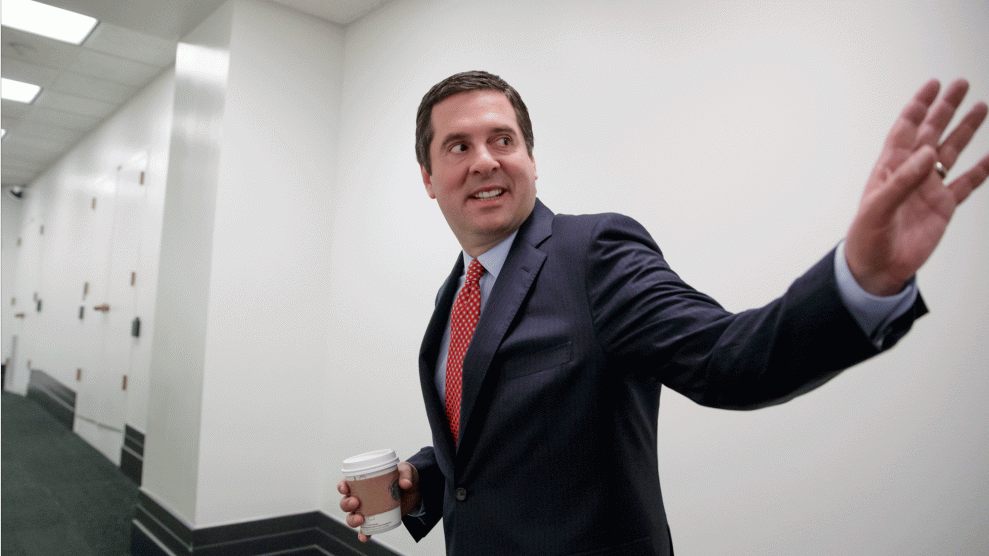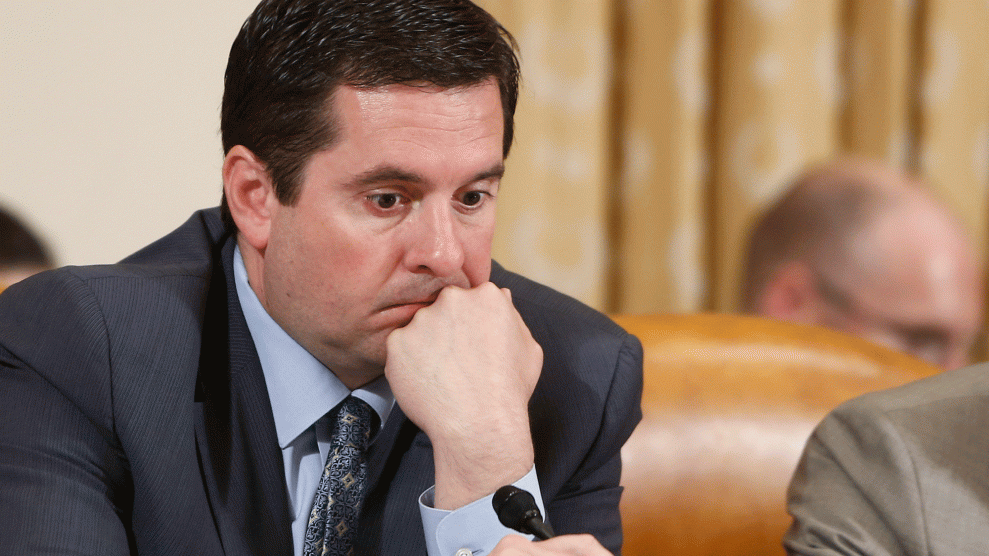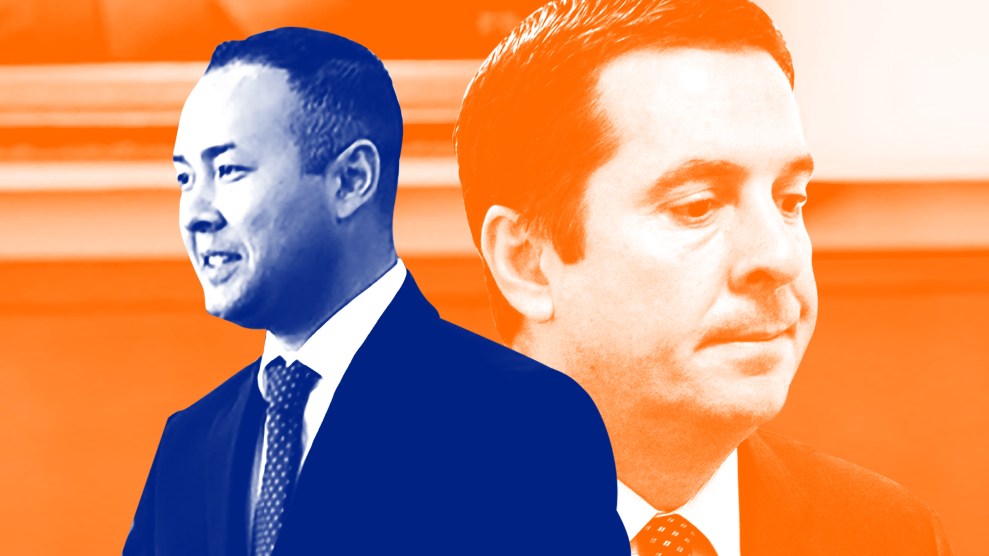
House Intelligence Committee Chairman Rep. Devin Nunes (R-CA) on Capitol Hill in April 2017.J. Scott Applewhite/AP
For nearly two decades, Rep. Devin Nunes had enjoyed an amiable relationship with the Fresno Bee, the largest local paper near his district in California’s Central Valley. That ended on January 25, when the Bee’s editorial board published an eviscerating editorial about the veteran Republican congressman. Nunes, the chair of the House Intelligence Committee, had been accusing the FBI of allegedly abusing a secret surveillance program in order to target the Trump campaign and undermine his presidency. Democrats said Nunes was attempting to discredit his own committee’s investigation into Russian interference in the 2016 presidential election. Nunes claimed that a soon-to-be declassified four-page memo he’d written would prove everything.
The Bee‘s editorial board wasn’t buying it. Its piece titled “Rep. Devin Nunes, Trump’s Stooge, Attacks FBI” opened with this no-holds-barred lead:
What, pray tell, does Rep. Devin Nunes think he’s doing by waving around a secret memo attacking the FBI, the nation’s premier law enforcement agency? He certainly isn’t representing his Central Valley constituents or Californians, who care much more about health care, jobs and, yes, protecting Dreamers than about the latest conspiracy theory. Instead, he’s doing dirty work for House Republican leaders trying to protect President Donald Trump in the Russia investigation.
It was the first public rift between the Bee‘s editorial board and the veteran Tulare County Republican. The Bee‘s editorial page had stayed silent eight months earlier when Nunes made headlines with his “midnight run” to the White House, when he purportedly read classified documents and then held a solo press conference the next morning to repeat the Trump administration’s claims that the Obama administration may have illegally spied on its transition team. The much-hyped Nunes memo, however, marked a turning point. “This was not something we took lightly. It was very seriously thought out,” says Gail Marshall, the Bee‘s editorial page editor. “We wanted to get his attention and the attention of the people on this direction he’s going. And I think it succeeded in that.”
In response, Nunes has lashed out at the Bee—including the reporters whose work is separate from its editorial page. In an interview with Bee reporter Rory Appleton on February 22, Nunes called the paper “a joke” and a “left-wing rag.” Nunes fumed when Appleton asked him if he would be holding any public forums or town halls during the 2018 election cycle. “You know—it’s actually sad,” he said. “I actually feel bad for the people who work at the Bee.”
National outlets reported on the unexpectedly harsh January editorial, and emails, letters, and phone calls from around the country started pouring into the Bee. “We expected a lot of pushback,” says Marshall, but the overwhelming majority, she says, blasted Nunes, not the paper. A few days after Nunes went public with his memo, the Bee published a 13-letter sample of what they’d been receiving. Eric Hanson of Minneapolis asked, “Is Devin Nunes really as stupid as he is behaving?” In an appeal to voters in the district, John Mapes of Eugene, Oregon, wrote, “You elected Nunes and you need to fix this mess.”
The few critical letters the Bee received didn’t support Nunes so much as they railed against his perceived enemies, Marshall says. Targets included “the media, the Democrats, the evil dark state—always going back to some other evil villain, but not jumping up and saying, ‘Here’s my experience with Congressman Nunes. Here’s how he helped us.'”
Since its first critical editorial ran, the Bee‘s editorial page has continued to call out Nunes not only for his role in gumming up the Trump-Russia investigation, but also for his lackluster record. Nunes is considered a champion of water rights in his heavily agricultural district, but he has delivered few tangible results. Since 2013, only two of his bills have become law, and neither was related to water. In his interview with Appleton, he struggled to detail any major accomplishments during his 15 years in office. “We’re still talking about needing storage, needing to move water. By now, we should have dams with his name on them,” says Marshall. “He’s been at this a long time. I and a lot of other people don’t see a lot of great results coming from it.”
Marshall thinks that Nunes is increasingly “afraid of talking to his constituent press, his constituents, and of meeting with people.” He reportedly hasn’t held a town hall since 2010. His constituents, Marshall says, “wanted to talk to their congressman, and he was having none of it. He was getting more and more distant from us, more and more partisan, and more and more allied to his Washington duties, and less interested in us,” Marshall says.
Nunes and the Bee didn’t always have such a combative relationship. For more than 20 years, the Bee‘s reporting on him has been straightforward and its editorial board has recommended him for reelection “time after time,” says Marshall. In 1996, at just 23 years old, Nunes unseated a long-time incumbent on a community college board. “Who doesn’t love a young upstart college student who is eager to get into politics and have his voice heard?” notes Marshall. In 1998, Nunes tried to run for Congress, but the elections office said he was too young. He challenged the decision, and a judge ruled in his favor after he noted that he would be 25 by election day. (He lost in the primary.) In 2001, President George W. Bush appointed him to be California’s director of rural development for the Department of Agriculture. He was elected to Congress in 2003 and quickly gained a reputation as an up-and-coming young Republican. In the early years, Marshall says, Nunes was “very personable, very willing to talk to everybody; he was visible in the district. He gave us no reason to be very upset with him.”
The relationship first started to sour in 2010 when Nunes got in a tiff with a Bee reporter who covered Dream Act advocates who picketed in front of his Visalia office during a Christmas open house. Nunes accused the demonstrators of “bringing [the Bee] with them,” says Marshall. Afterward, “Nunes didn’t speak to the reporter for a year.” (Nunes’ office did not respond to a request for comment.)
The Bee’s editorial page continued to recommend Nunes for reelection throughout this time, including in 2016. Then, in March 2017, Nunes took offense at a piece written by veteran Bee reporter Lewis Griswold, who had been covering him since his political career began in the late ’90s. After Nunes made his late-night dash to the White House in January, Griswold went to the congressman’s neighborhood to find out how his neighbors and friends felt about the sudden blitz of negative attention he was receiving. The people Griswold spoke with were critical of the coverage and supportive of Nunes. “Devin is a fine person,” one told him. “He’s a person who stands behind what he says,” said another.
It was a slightly puffy local-angle piece, but Nunes’ people saw it differently. “They got really furious,” Marshall recalls. Nunes’ chief of staff told Griswold that he had no right to speak with people who live near Nunes and his family, and that his office would never speak to the Bee again. “We’ve had poor communication with him ever since,” says Marshall.
Meanwhile, Nunes had created his own alternative news site, The California Republican. It resembled a local conservative news site, propagating GOP-friendly stories, but fine print at the bottom of the page read, “Paid for by the Devin Nunes Campaign Committee.” The site’s short-lived but fiery Twitter feed made digs at immigrants and LGBT people, suggested male privilege doesn’t exist, and retweeted conspiracy theorist Alex Jones before abruptly going dark in mid-February.
For Nunes, the stakes are higher now than ever before. For the first time in his career, he is facing a serious Democratic challenger, 34-year-old Fresno prosecutor Andrew Janz. Janz raised more than $100,000 in the days after Nunes made his memo public, and he is reportedly on track to raise $1 million this quarter. He’s noticed the change of tone in the Bee‘s op-ed pages. “When the Fresno Bee ran that editorial, it was a big deal,” Janz said in February. “It had always supported him before.”
It’s hard to tell what kind of impact the Nunes-Bee split will have on the election. While it may be a sign that the political winds are shifting in his traditionally Republican district, it probably doesn’t trouble his base. “A lot of Congressman Nunes’ supporters probably aren’t big Bee fans,” says Tom Holyoke, a professor of political science at Fresno State University. “I think for a lot of Republicans in that district, talk radio and stuff on the internet has become their go-to source of news rather than the Bee. The Bee has done as good of a job as it could have done in trying to maintain an even keel politically, leaning neither left nor right, but Nunes’ district has become more conservative. [The Bee] fell out of line with a lot of Republicans there, but I think it was the district that shifted rather than the paper.”
On that last point, Marshall agrees: “We didn’t change. He changed.”

















